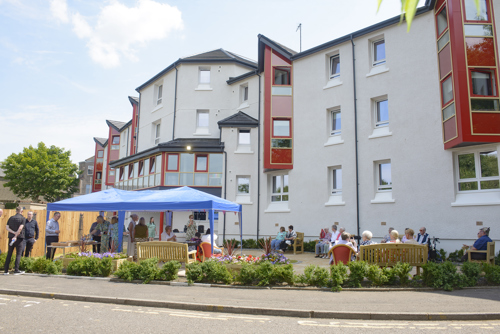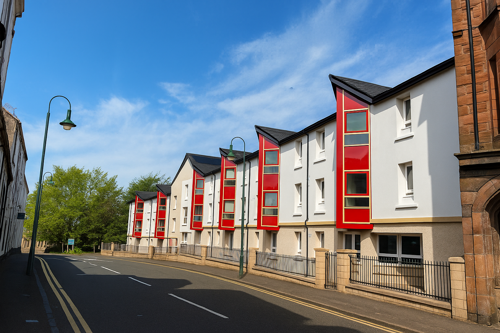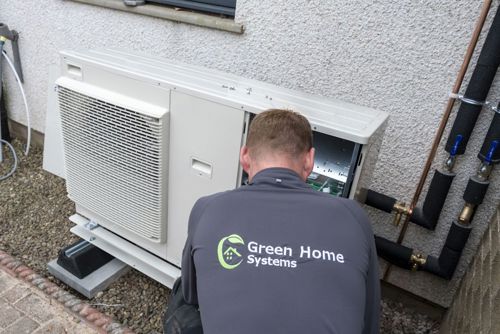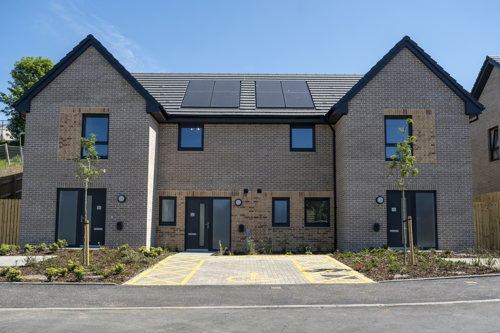Scotland Housing Awards 2025
Read all the shortlisted entries into this award category, net zero in housing, at the Scotland Housing Awards (SHA) 2025 and find out who won the award on the night.
The housing sector, like many others, is faced with the challenge of cutting carbon emissions to achieve the Scottish governments’ net zero targets. This award celebrates organisations that can demonstrate they have overcome some of the significant challenges in cutting carbon emissions.
This award was sponsored by C~urb.
Winning project name
Kelvin Court Energy Efficiency Retrofit
Winning organisation
Hanover Scotland
Statement of support
Hanover’s Kelvin Court development is a sheltered housing complex located at the northern edge of Kirkintilloch, East Dunbartonshire, which comprises 35 sheltered housing flats, with a communal lounge.
The existing structure was failing to meet energy efficiency standards due to its outdated building fabric and storage heaters, putting residents at risk of fuel poverty and failing government energy efficiency targets.

In close collaboration with Carbon Futures and Union Technical Services, a comprehensive feasibility study identified a suite of potential energy-saving measures. The size of the dwellings and acoustic compliance within MCS guidelines prohibited installation of ASHP and GSHP technologies, so the following measures were implemented:
- External Wall Insulation to minimise heat loss and improve thermal comfort following PAS 2035 fabric first methodology.
- Installation of 156 photovoltaic roof solar panels to harness renewable energy from the sun, reducing reliance on the grid and distributing microgeneration to individual dwellings from a communal roof. The Allume Solshare PV panel system monitors electricity demand based on each individual user’s habits as well as external conditions, and distributes energy based on individual demand, reducing grid energy consumption by 35-40 per cent.
- Battery Storage of surplus solar energy for later use or from the grid at off peak times.
- Replacement of outdated storage heaters with modern, easy to use, high-efficiency Elnur Smart High Heat Retention Storage Heaters with smart technology to integrate with Solar PV for precise temperature control and energy management, including cheaper night tariffs to store heat for release during the day.
- Triple glazed windows to enhance insulation and reduce heat transfer.
This project ran from September 2024 to June 2025, coinciding with a pre-planned roof renewal. Rather than replacing “like for like” Hanover took the opportunity to provide a whole development upgrade, which was carefully coordinated to minimise disruption to residents, who remained within their homes throughout the process. Residents were consulted in advance and kept informed through Hanover’s usual multi-channel approach.

By removing energy inefficiencies, reducing carbon emissions, and improving tenants’ wellbeing, the £2.1 million project supports the Scottish government's broader climate action, energy efficiency, and social housing strategies and attracted grant funding worth £538K from the Social Housing Net Zero Heat Fund.
Specific benefits include
For Hanover’s tenants:
- Lower utility bills and long term savings: up to 60 per cent reductions in energy costs (Average energy cost per flat expected to reduce from £539.65 to £268.79), helping alleviate fuel poverty. Sustainable energy solutions and grant funding provide ongoing financial stability for the business and reduce future maintenance costs.
- Enhanced comfort and tangible health benefits: Upgraded building fabric and heating systems create a safer, healthier, and more desirable living space through better thermal control and comfort, indoor air quality and stable temperatures.
- Integrated approach: Combination with roof replacement minimised disruption to tenants and environmental impact, reflecting efficient use of resources.
For the wider community:
- Community and economic benefits: The project supported local contractors and employment through creating jobs and opportunities for training and upskilling to a total of 170 people.
- Promotes a culture of innovation: project sets a precedent for sustainable development in the local area and within Hanover.
For our planet:
- Improved energy efficiency and environmental sustainability: Sustainable building practices enhance energy efficiency and reduce reliance on non-renewable energy sources, overall energy consumption and carbon footprint. Estimated annual energy savings of 132,161 kWh, reducing carbon emissions by 65.58 tonnes.
- Alignment with Scottish government net zero goals and policies on climate action, energy efficiency, and social housing improvements.
Continuous post evaluation performance assessments will be completed to inform future retrofit projects.
Outcomes and achievements
The Kelvin Court Energy Efficiency Retrofit project represents a proactive approach to addressing energy inefficiencies in social housing, with a focus on improving living conditions and reducing environmental impact. This retrofit project has not only modernised the properties but also transformed them into low-carbon, energy-smart homes.
Achievements to date include:
- Net zero goals: The project supports Scotland's ambitious targets for reducing carbon emissions by retrofitting existing social housing to improve energy efficiency and reduce greenhouse gas emissions. Measures like solar PV panels, battery storage, and high heat retention storage heaters contribute to environmental sustainability.
- Reduced cost and risk of fuel poverty: By lowering energy consumption and cost, the project helps alleviate fuel poverty among tenants, aligning with the government's focus on affordability and improving living conditions for vulnerable populations.
- Improved comfort for residents: easy to use storage heaters and better thermal comfort and indoor air quality.
- Increased EPC rating of building from C and D to high B (88-89 levels). Estimated annual energy savings: 144,621 kWh for 35 flats. Estimated CO2 savings: 30,707 kgCO2 (lifetime savings: 614 tons).
Shortlisted entries
Trust Housing Association - Isle of Arran Energy Efficiency Improvements
Application entry
- Project name: Isle of Arran Energy Efficiency Improvements
- Lead organisation: Trust Housing Association
Statement of support
Trust Housing Association is a leading provider of affordable housing across Scotland, committed to delivering high quality homes and services that enhance the lives of their customers. Trust’s expertise includes energy management, procurement, retrofit, remodelling and driving high energy efficiency standards, all underpinned by a strong commitment to sustainability and long-term net zero goals.
As the Isle of Arran’s largest social housing provider, with almost 300 homes, Trust has been making a significant impact on the island’s energy efficiency landscape over 2024/25. The Isle of Arran is off-gas grid and islanders are disproportionately affected by higher energy costs and fuel poverty, due to the lack of access to the natural gas network. Heating sources have historically been more expensive on the island, predominantly electric or oil-heating.

In summer 2024, a transformative retrofit programme was launched across their Arran stock, with over £3 million worth of investment upgrades across 252 homes on the Island, 60 per cent of which were classified as ‘hard-to-treat’. Delivered in partnership with Ayrshire-based ‘Green Home Systems’ (GHS), following extensive retrofit assessments on each home, the projects multi-measure improvements included the following upgrades:
- Underfloor, loft, and room-in-roof insulation
- High Heatetention Storage Heaters
- Solar PV systems
- External battery storage for every home
- Air Source Heat Pumps
- New ventilation systems.
The success of Trust Housing Association’s energy efficiency programme on the Isle of Arran has been made possible through a strong, values-driven partnership with industry leader GHS. Trust and GHS share the commitment to tackling fuel poverty and delivering sustainable, high-quality housing solutions.
All 252 homes have been upgraded to EPC band B’s from starting bands of D-F. The estimated overall carbon emissions savings from the works are 171tCO2e and the estimated annual energy bills saving is in excess of £225,000 per annum, helping Trust reduce its overall carbon footprint and help its customers reduce bills and improve thermal comfort all year round. Trust, through their partnership with GHS has leveraged in substantial ECO4 Funding to deliver this this project, avoiding the need to pass costs onto tenants and promoting a just transition to net zero. The works on Arran were complemented by fabric improvements during 2024/25 of new PVC-U windows and doors to 91 homes across the villages of Brodick, Lamlash, Shiskine, Corrie and Kilmory.
Ms Galloway, a Trust Housing Association customer, had solar panels and a battery storage system installed in her home in July 2024 as part of the Isle of Arran energy efficiency programme. She had already noticed a positive impact on her energy usage and bills when speaking to us in March 2025, noting, “The monetary savings have been seen in my energy bills already, even though we are in the winter months. However, I am really looking forward to the summer months where we can see the extra savings in energy with the brighter days.”
Trust is committed to delivering high-quality, energy-efficient solutions and to that end, GHS, is accredited by:
- TrustMark
- Quality Mark
- MCS
- PAS 2035:2023.
These accreditations and where required, certifications, ensure that all works meet the highest standards of safety, quality, and sustainability.
Trust’s holistic approach - combining environmental responsibility with social care - makes them a standout nominee for this ‘Net Zero in Housing’ award.
Outcomes and achievements
Upgrading the EPC bands of 252 rural homes to band B, in addition to providing some of their most disadvantaged customers with immediate energy bill savings, has been an outstanding achievement.
The programme of works has generated £76,000 in contractual community benefits, which have been reinvested into their Hardship Fund, which supports customers across Scotland facing financial difficulties due to the cost of living crisis. The fund provides assistance with essentials such as food, utility bills, and household expenses. This initiative exemplifies Trust’s commitment to social impact - leveraging infrastructure investment to deliver direct financial aid to those most in need.
The Arran works are already proving a benefit to customers, making their homes warmer and easier to heat. The feedback has been incredible and, as a result, Trust are keen to extend the benefits to as many customers as possible. Building on the success of the Arran project, plans for a further phase of works with GHS across 298 homes in the North and West of the country are progressing and the team at Trust have been sharing their experiences and approaches with several other RSL partners, many of which are only at the beginning of their decarbonisation journey.
West Dunbartonshire Council - Pappert
Application entry
- Project name: Pappert
- Lead organisation: West Dunbartonshire Council
- Partner organisations: CCG (Scotland) and MAST Architects
Statement of support
Location
Pappert is a development of 26 homes for social rent in Bonhill, West Dunbartonshire. The 1.36ha site is bounded immediately to the north, south, and east by existing two-storey residential houses. A child’s informal play area and football pitch are located on the northeast/ east boundary, while the site is within close reach of a regular bus route and amenities in Alexandria town centre - including Alexandria Train Station (1.3 miles), ALDI (1.5 miles) – and local schools (Lennox PS, one mile), leisure facilities and places of worship.

Layout
The site was formerly occupied by tenement flats but after they were demolished, it lay dormant for a significant period, becoming an area of dense vegetation except for a network of footpaths that connected to the surrounding terraces. The biggest challenge to the design and construction of the development was the topography, with a 20 metre level difference falling from east to west. This challenge was also recognised as an opportunity, with the ability to provide excellent views of the neighbouring hills. Several of the existing pedestrian routes were also retained, and new connections formed to ensure wider community integration.
The housing mix of two-storey terraced homes reflects the surrounding architectural context, while their style and configuration respond to localised housing needs, particularly those of families:
- One bed/two person cottage flat (six)
- Two bed/three person wheelchair accessible cottage flat (three)
- Three bed/five person houses (nine)
- Four bed/six person house (four)
- Four bed/seven person house (one).
All homes have access to their own garden space. Parking is 100 per cent across the one to three bedroom house types, with 200 per cent provision for the four-bedroom property. Each home has an EV charging point.
Design
All of the homes are designed to comply with Housing for Varying Needs, Secure by Design, and with West Dunbartonshire’s Housing Design standard. They range from 65sqm to 138sqm with the aim of maximising tenancy flexibility and enabling future adaption. This includes a ground-floor double-bedroom in each home, as well as barrier free level access.
Ample integrated storage, and sprinklers are among the features that offer support and improved safety for each residence.
Through direct appointment to the contract, CCG was involved in the design process at the early stages of development. This “early contractor involvement” approach utilises CCG’s in-house technical and divisional expertise and helped to identify any potential risks and delays to project delivery. Undertaken on an open-book basis with the council alongside the contractor-appointed design team, any identified issues were carefully managed while relevant opportunities for value creation and driving overall project costs down (without compromising quality) were highlighted and implemented timeously. The process was made easier through an already existing, long-term relationship with the council which has been in place since 2019 across eight developments, and contributed greatly to realising their sustainability ambitions.
Net zero and Passivhaus
Of the 26 homes, 20 have been constructed to the CCG’s net zero home build standard (compliant with Gold Aspect 1 and 2 and equivalent to Platinum Aspect 1 of Scottish Building Regs), and six are Passivhaus Classic-accredited – the first of their kind in the local authority. All homes place emphasis on a fabric first approach, with enhanced airtightness (including thermal-bridge-free design for the Passiv plots) achieved through use of CCG’s offsite-manufactured iQ Timber System, triple-glazed PVCu windows, and enhanced door sets to drastically minimise heat loss. Air-source heat pumps are in place to provide space heating and hot water services. The net zero homes have the added benefit of solar battery storage units. The units connect to between nine and 12 solar panels, and store energy for later use, with the benefit of cheaper evening energy tariffs.
Outcomes and achievements
CCG used sustainable materials and zero-waste manufacturing processes to deliver these new homes, lowering embodied carbon emissions. Then, through a combination of fabric performance and zero-emissions technologies, operational carbon emissions have been significantly reduced, with an annual energy demand for space heating ranging from 1.69 to 24.13kWH/m2, and Low or Zero Carbon Generating Technologies (LZCGT) abatement, on average, 103.58 per cent across the development. A max EPC rating of 105 (A), and Environmental Impact Rating of 101 (A) has been achieved, with operational energy costs from as little as £35pcm. This means that carbon emissions have been significantly reduced at each stage of the development’s delivery, as well as throughout its lifetime.
Tenants in the immediate term will significantly benefit from lower energy costs, while the council have homes that are future-proofed to changes in building legislation, as well as a real-time comparison of varying building standards, which will help to inform the future of affordable housebuilding in the region as the country embarks upon its transition to net zero by 2045.



